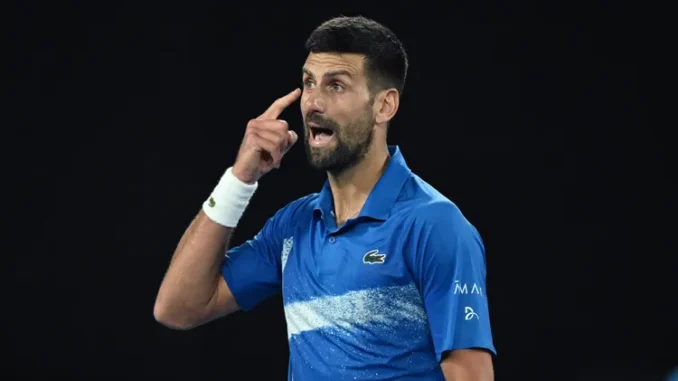
The echoes of the Australian Open had barely faded when Novak Djokovic, a titan of the tennis world, found himself embroiled in a controversy that extended beyond the boundaries of the court. His dramatic exit from the tournament, marked by physical struggles and ultimately a retirement, became a subject of intense scrutiny, fueled in part by comments made by tennis legend John McEnroe. These comments, questioning the legitimacy of Djokovic’s injury, ignited a fire within the Serbian star, prompting him to take the unusual step of publicly sharing details of his medical condition. The ensuing narrative reveals not only the pressures faced by elite athletes but also the delicate interplay between public perception, personal privacy, and the intense desire to compete at the highest level.
Djokovic’s Australian Open campaign was a rollercoaster ride. He battled through grueling matches, often appearing to be in considerable pain. His on-court demeanor hinted at a deeper struggle, a fight not just against his opponents but also against his own body. The eventual retirement, while disappointing for fans, seemed to signal the culmination of this internal battle. However, the narrative took an unexpected turn when McEnroe, known for his candid commentary, cast doubt on the severity of Djokovic’s injury. These comments, seemingly dismissive of Djokovic’s physical struggles, struck a nerve.
“I was mentally extremely down,” Djokovic later revealed, highlighting the emotional toll of the situation. The combination of physical pain, the disappointment of retiring from a Grand Slam tournament, and the public questioning of his integrity created a perfect storm of negativity. He felt not only physically compromised but also emotionally vulnerable.
The comments from McEnroe, a respected figure in the tennis world, added a layer of complexity to the situation. They weren’t just casual observations; they carried weight and influence, shaping public perception of Djokovic’s withdrawal. For Djokovic, this wasn’t just about his physical well-being; it was also about his reputation, his credibility, and his legacy.
“I felt the need to react,” Djokovic explained, articulating the motivation behind his decision to share his MRI results. He felt compelled to defend himself, to provide concrete evidence of the injury that had forced him to retire. This decision, while perhaps unconventional, underscores the pressure faced by athletes to not only perform at the highest level but also to manage their public image.
The sharing of medical information, typically a private matter, was a significant step for Djokovic. It highlighted the extent to which he felt his integrity had been challenged. He felt the need to provide irrefutable proof of his injury, to silence the doubters and reclaim control of the narrative surrounding his withdrawal. This decision, while intended to clarify the situation, also opened a window into the intense pressures faced by professional athletes.
The incident also sparked a wider conversation about the role of commentators and the impact of their words on athletes. While commentators have a responsibility to provide analysis and insights, their words can have a profound effect on public perception. In Djokovic’s case, the comments questioning his injury not only affected him personally but also fueled speculation and debate among fans.
The aftermath of the Australian Open and the subsequent controversy surrounding Djokovic’s injury served as a reminder that athletes are not just performers; they are human beings with emotions and vulnerabilities. They are subject to intense scrutiny, both on and off the court, and their actions are often dissected and analyzed by the public. The pressure to perform, the weight of expectations, and the constant scrutiny can take a toll, even on the most seasoned professionals.
Djokovic’s decision to share his MRI results, while perhaps unusual, reflects the challenges faced by athletes in managing their public image and defending their reputations. It underscores the importance of empathy and understanding when it comes to judging athletes’ decisions, particularly when dealing with injuries and personal matters. The incident serves as a reminder that behind the fierce competitors and public personas are individuals who are susceptible to emotional distress and who deserve a degree of respect and privacy. The complexities of navigating the world of professional sports, where performance, reputation, and public perception are intertwined, are brought sharply into focus by such events. Djokovic’s response to the criticism he faced offers a glimpse into the pressures of elite sport and the lengths to which athletes will go to defend their integrity.
Leave a Reply